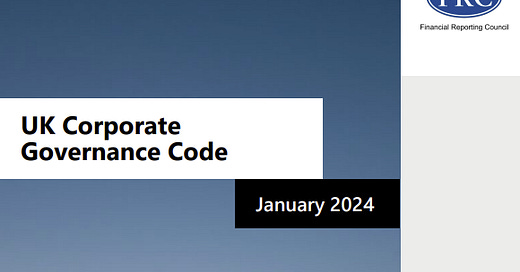Corporate governance – advances or retreats?
The Financial Times reports that the latest version of the UK Corporate Governance Code, launched on January 22, adds more work to the work of directors of listed companies. It also reports that it’s pulling back from possible new provisions. The headline reads: “FRC imposes extra duties on UK company directors.” The subhead adds: “Overhaul of rules falls well short of original proposals floated in wake of several high-profile corporate failures.” The Financial Reporting Council giveth and the Financial Reporting Council taketh away.
I’ll come back to this topic later, once I’ve had the chance to look through the very substantial 189 submissions the FRC received to the consultation it conducted in the second half of 2023 to assess what is that what might have been. But it’s not surprising that something, somewhere had to give. The FT quoted FRC chair Richard Moriarty saying, “We have got to keep an eye on the stock and the overall level of the burdens that we’re requiring on businesses.”
Echoing the outcome of various others since the major code revision in 2010, Julia Hoggett, chief executive of the London Stock Exchange, said last year that companies felt the code’s “comply or explain” regime had become “comply or else”. In effect, asset management organisations weren’t making the effort to understand what companies were doing, but instead outsourcing their judgement to corporate governance rating agencies, something I’ve written about at length in The Cadbury Code and Recurrent Crisis (Nordberg, 2020). That book tracks the history of the UK code from its 1992 origins to through the first two major overhauls in 2003 and 2010, detailing how its authors strove for flexibility and its implementation ossified. Compliance trumped intent.
The London Stock Exchange is in a good position to judge. It’s lost a lot of potential initial public offerings to other trading venues recently – which also makes it a particularly biased observer. But it’s also a company listed on the exchange it operates, so it knows whereof it speaks.
More, later …
Nordberg, D. (2020). The Cadbury Code and Recurrent Crisis: A Model for Corporate Governance? Cham, Switzerland: Palgrave Macmillan.
![How to govern [not like that]](https://substackcdn.com/image/fetch/$s_!emEQ!,w_80,h_80,c_fill,f_auto,q_auto:good,fl_progressive:steep,g_auto/https%3A%2F%2Fsubstack-post-media.s3.amazonaws.com%2Fpublic%2Fimages%2Fa9d7f587-4c16-42f0-9526-b00edc0ab4c8_155x155.png)
![How to govern [not like that]](https://substackcdn.com/image/fetch/$s_!Te2X!,e_trim:10:white/e_trim:10:transparent/h_72,c_limit,f_auto,q_auto:good,fl_progressive:steep/https%3A%2F%2Fsubstack-post-media.s3.amazonaws.com%2Fpublic%2Fimages%2F51c6c618-ff5a-481b-b4e2-28047c606ca8_990x369.jpeg)

![How to govern [not like that]](https://substackcdn.com/image/fetch/$s_!emEQ!,w_36,h_36,c_fill,f_auto,q_auto:good,fl_progressive:steep,g_auto/https%3A%2F%2Fsubstack-post-media.s3.amazonaws.com%2Fpublic%2Fimages%2Fa9d7f587-4c16-42f0-9526-b00edc0ab4c8_155x155.png)

